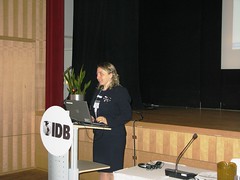
Georgia is a top reformer during according to the World Bank. Ms. Tchelishvili described some of the initiatives taken by the government since 2003 such as the adoption of the Treasury Single Account (TSA). She described the difficulties of accounting for government businesses and local service providers like hospital. Government entities operated on a cash basis, but parastatal organizations operated on accrual accounting. Consolidation is almost impossible to achieve given so many different systems and accounting methods.
Ms. Tchelishvili described some limitations including the lack of an Integrated Financial Management Information System.
Ms. Tchelishvili described the six phase strategy implementation strategy in Georgia:
- 2010 Initiation
Strategy agreed; Georgian Public Sector Accounting Standards Board formed; translation IPSAS initiated - 2012 Pilot
Pilot financial statements under modified cash basis IPSAS - 2015 Modified Cash IPSAS
Gov’t consolidated financial statements (excluding GBEs) under modified cash IPSAS (cash IPSAS + additional information) - 2017 Some accrual
Simple accrual information provided under modified cash IPSAS Part II (GBEs not consolidated) - 2020 Accrual IPSAS
Financial statements in full compliance accrual IPSAS - Ongoing
Programme for ongoing adoption of new IPSAS
Ms. Tchelishvili described the capacity building process in Georgia using a certification process that professionalizing public accountants.
Ms. Tchelishvili described the differences in GFS and IPSAS definitions of government entity and government sector. She pointed out the reform in Georgia will cover all aspects of the public sector. She provided a decision-tree to define whether an organization is a government-owned business or a non-profit organization controlled by the government.
The modified cash approach to be used by the Government of Georgia in phase 3 using IPSAS 2 format cash flow statements. Ms. Tchelishvili described the mandatory and encouraged portions of the standard.
Ms. Tchelishvili described the current status in the Republic of Georgia:
- IPSAS Strategy adopted and approved by Ministerial Decree in 2009
- Georgian Public Sector Accounting Standards Board (GPSASB) established as permanent consultative body under the Government of Georgia in 2010
- 11 different pilot organizations selected for implementing modified cash basis IPSAS.
Lessons learned from the IPSAS project include:
- If supporting GFS 2001, not that difficult to support IPSAS modified cash accounting
- IPSAS implementation needs to be phased over a decade or longer
- Fully implementing the Cash Basis IPSAS at national government level is not feasible for any country
- A country is not compliant with accrual IPSAS until all implemented and is not feasible except in very long term
Ms. Tchelishvili conducting a survey of attendees about IPSAS:
- 44% same Chart of Accounts for cash and accrual accounting, 40% plan to implement, 16% no plans
- 26% Permanent independent body for IPSAS, 22% consultative body under the government, no board 52%
- 82% agreed that IPSAS requires an Integrated Financial Management System (IPSAS) to succeed
- Most important success factor for IPSAS adoption: 61% political leadership, 21% IFMIS, 18% skilled staff, 0% dedicated staff





No comments:
Post a Comment